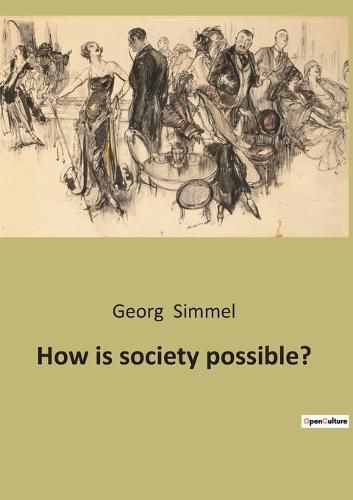Readings Newsletter
Become a Readings Member to make your shopping experience even easier.
Sign in or sign up for free!
You’re not far away from qualifying for FREE standard shipping within Australia
You’ve qualified for FREE standard shipping within Australia
The cart is loading…






Georg Simmel's essay "How Is Society Possible?" is built on the idea that an individual can develop himself or herself fully only by entering into society but nevertheless remains marked with an "in-addition" or "individuality-nucleus" that is never entirely socialized. Georg Simmel, American Journal of Sociology, vol. 16 (1910-11) "Kant could propose and answer the fundamental question of his philosophy, How is nature possible?, only because for him nature was nothing but the representation (Vorstellung) of nature. This does not mean merely that "the world is my representation," that we thus can speak of nature only so far as it is a content of our consciousness, but that what we call nature is a special way in which our intellect assembles, orders, and forms the sense perceptions. These "given" perceptions, of color, taste, tone, temperature, resistance, smell, which in the accidental sequence of subjective experience course through our consciousness, are in and of themselves not yet "nature;" but they become "nature" through the activity of the mind, which combines them into objects and series of objects, into substances and attributes and into causal coherences."
$9.00 standard shipping within Australia
FREE standard shipping within Australia for orders over $100.00
Express & International shipping calculated at checkout
Georg Simmel's essay "How Is Society Possible?" is built on the idea that an individual can develop himself or herself fully only by entering into society but nevertheless remains marked with an "in-addition" or "individuality-nucleus" that is never entirely socialized. Georg Simmel, American Journal of Sociology, vol. 16 (1910-11) "Kant could propose and answer the fundamental question of his philosophy, How is nature possible?, only because for him nature was nothing but the representation (Vorstellung) of nature. This does not mean merely that "the world is my representation," that we thus can speak of nature only so far as it is a content of our consciousness, but that what we call nature is a special way in which our intellect assembles, orders, and forms the sense perceptions. These "given" perceptions, of color, taste, tone, temperature, resistance, smell, which in the accidental sequence of subjective experience course through our consciousness, are in and of themselves not yet "nature;" but they become "nature" through the activity of the mind, which combines them into objects and series of objects, into substances and attributes and into causal coherences."